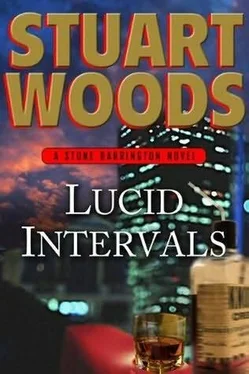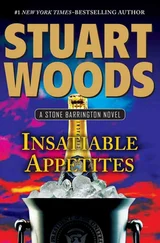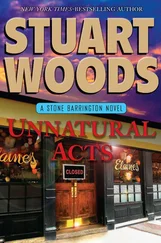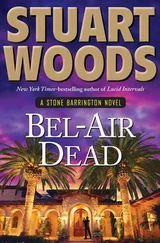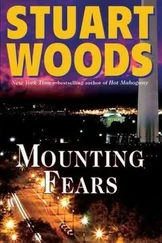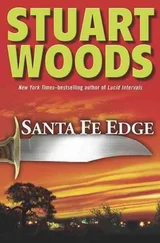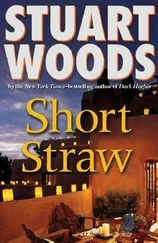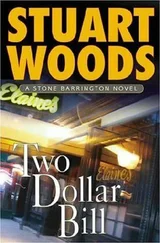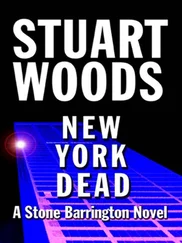
Stuart Woods
Lucid Intervals
Book 18 in the Stone Barrington series, 2010
This book is for Ted and Barbara Flicker.
Elaine’s, late.
Stone Barrington and Dino Bacchetti were sitting at their usual table, eating penne with shrimp and vodka sauce, when a young man named Herbert Fisher walked in with a tall young woman.
Stone ignored him. Herbie Fisher was the nephew of Bob Cantor, a retired cop with whom Stone had worked many times. Bob Cantor was Herbie’s only connection with reality. Herbie Fisher, in Stone’s experience, was a walking catastrophe.
Herbie seated his girl at a table to the rear, then walked back and took a chair at Stone’s table. “Hi, Stone,” he said. “Hi, Dino.”
“Dino,” Stone said, “you are a police officer, are you not?”
“I am,” said Dino, spearing a shrimp.
“I wish to make a complaint.”
“Go right ahead,” Dino said.
“What’s going on, Stone?” Herbie asked.
Stone ignored him. “There is an intruder at my table; I wish to have him removed.”
“Remove him yourself,” Dino said. “I’m eating penne with shrimp and vodka sauce.”
“You are a duly constituted officer of the law, are you not?” Stone asked.
“Once again, I am.”
“Then it is your duty to respond to the complaint of an upstanding citizen.”
“What kind of citizen?”
“Upstanding.”
“I’m not at all sure that the word describes you, Stone.”
Herbie, whose head was following the conversation as if he were seated in the first row at Wimbledon, said, “No kidding, Stone, what’s going on?”
Stone continued to ignore him. “Dino, am I to understand that you are ignoring a citizen’s complaint?”
“You are to understand that,” Dino said, mopping up some vodka sauce with a slice of bread. “Do your own dirty work.”
“Stone,” Herbie said, “I’m rich.”
“That’s rich,” Dino replied.
“No kidding, I’m rich. I won the lottery.”
“How much?” Dino asked.
“Don’t encourage him,” Stone said.
“Thirty million dollars,” Herbie replied.
“How much you got left after taxes and paying off your bookie and your loan shark?” Dino asked.
“I’m warning you,” Stone said. “Don’t encourage him, he’s dangerous.”
“Approximately fourteen million, two,” Herbie replied. “I want to hire you as my lawyer, Stone,” he continued.
“Why do you need a lawyer?” Dino asked.
“All rich people need lawyers,” Herbie said.
“Could you be more specific?” Dino asked.
“Dino,” Stone said, “stop this, stop it right now. He’s sucking you in.”
“Prove you’re rich, Herbie,” Dino said.
“I’ll be right back,” Herbie said. He got up, walked back to where the girl sat, picked up her large handbag, came back to Stone’s table and sat down. He lifted up the handbag and opened it wide, displaying the contents to Stone and Dino. “What do you think that is?” he asked.
“Well,” Dino said, gazing into the purse, “that would appear to be approximately twenty bundles of one-hundred-dollar bills each, or two million dollars.”
“Absolutely correct,” Herbie said.
“Do you always walk around with that much money, Herbie?” Dino asked.
“Only since I got rich.”
“Oh.”
“Stone, I want to retain you as my lawyer. I’ll pay you a one-million-dollar retainer in cash, right now.”
Stone stopped eating. “Dino, have you had any recent training at recognizing counterfeit bills?”
“Funny you should mention that,” Dino said. “We had a guy in from Treasury the day before yesterday who gave us a slide-show presentation on that very subject.”
“Would you examine the bills in the bag, please?”
Dino dipped into the bag and came out with a hundred-dollar bill. He held it up to the light, snapped it a couple of times and laid it on the table. “Entirely genuine,” Dino said, then he turned to Herbie. “They don’t hand out millions in cash at the lottery office, you know. Where did you get it?”
“I cashed a check,” Herbie replied.
Stone flagged down a passing waiter. “David,” he said, “would you please go and find me a good-sized paper bag?”
“Sure,” David replied. He went into the kitchen and came back with a plastic shopping bag. “No paper bags. Will this do?”
“Yes,” Stone said, accepting the bag and handing it to Dino. “Will you please put one million dollars of Herbie’s money into this bag, Dino?”
“That okay with you, Herbie?”
“Sure, go ahead,” Herbie replied.
Dino held the plastic bag close to the purse and counted out ten of the bundles. He handed the bag to Stone. “There you go.”
“Just put it on the floor beside me,” Stone said, and Dino did so. Stone looked at Herbie for the first time. “All right, you’ve got my attention; I’ll listen for one minute.”
“They’re trying to kill me,” Herbie said.
“Who is trying to kill you?”
“People who want my money.”
“Are these people aware that you walk around with two million dollars of it in a woman’s handbag?”
Herbie shrugged. “Maybe.”
“Herbie, you’ve been flashing this money around, haven’t you?”
“Well, sort of.”
“The hooker must know about the money, since it’s in her handbag.”
“What hooker?”
“The one you walked in here with.”
“She’s not a hooker.”
“Herbie, she’s with you; she is, ipso facto, a hooker.”
“Part-time, maybe,” Herbie admitted.
“Who do hookers work for, Herbie?”
“Me?”
“Besides you?”
“Madams? Pimps?”
“And who do madams and pimps work for, Herbie?”
“They’re self-employed, aren’t they?”
“They work for or associate with bad people, Herbie. If a hooker knows you’ve got two million dollars in her handbag, then her madam and her pimp know it too, and if they’ve had a moment, they’ve already sold that information to someone who wants to take it from you.”
“Sheila wouldn’t do that,” Herbie said. “She loves me.”
At that moment, as if for punctuation at the end of Herbie’s sentence, a fist-sized hole appeared in the front window of Elaine’s, and a loud report rent the air. This was quickly followed by two more shots.
Everybody hit the floor.
Stone raised his head an inch. “Are you sure Sheila loves you, Herbie?”
Dino was up and running at the door, clawing at the gun on his belt. He disappeared into the street.
People began cautiously to pick themselves up, look around and brush themselves off. Elaine sat two tables down, unmoving, looking unperturbed. The door opened, and a tall woman of Stone’s acquaintance, though not recent, walked in carrying a very feminine attaché case.
Her name was Felicity Devonshire, though she was not called that by anyone who worked with her. She was, in fact, a high official of British intelligence who had formerly been called Carpenter but more recently, after a big promotion, had been dubbed Architect. A man had preceded her into the restaurant, and another followed her. They stationed themselves at the end of the bar, near the door, and watched the room.
Stone got up from the floor, dusted himself off, spotted Felicity and waved her over. They embraced casually. He could feel her ample breasts through her coat and his.
“Stone,” she said, “what is going on? Dino is out in the street waving a gun around and shouting into a cell phone, and this place is a mess.”
Читать дальше
